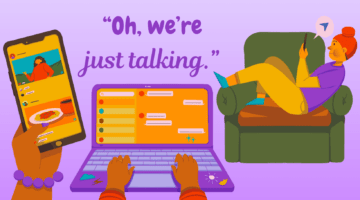How to be Successful at Online Dating, According to Science
April 19, 2017 by Justin Lehmiller
Americans are increasingly going online in order to find romantic and sexual partners. However, despite the popularity of online dating, most Americans have never tried it. That’s partially because there’s still some stigma attached to online dating, but it’s also because the sheer idea of it seems overwhelming to many. For example, how do you create an effective profile? This step alone can be very intimidating because a lot of people are worried about saying or posting the “wrong” thing and having that hurt their chances. Fortunately, there are some research-backed tips out there that can help to alleviate these fears and concerns.
In a recent paper published in the journal Evidence-Based Medicine, researchers exhaustively reviewed the scientific literature (86 studies in total) that addresses what people can do to improve their online dating experiences. Here are a few highlights with respect to creating a successful profile:
· Start by selecting a good screen name. Research suggests that you’re better off going with something that sounds cute and playful (like “Fun2Bwith”), as opposed to something that has negative implications or suggests feelings of inferiority (like “Little” or “Bugg”). Screen names that start with a letter closer to the beginning of the alphabet may have an advantage, too, because they’ll show up closer to the top in search results.
· When you upload your profile photo, try to choose a picture in which you have a genuine (not forced) smile and a slight tilt of the head (both of these features have been related to positive first impressions in previous research). If you upload a group photo anywhere on your profile, choose one in which you’re in the middle and the people around you are having a good time. Why? You want to give the impression that you’re someone people like to be around.
· Not all websites and apps require profile headlines, but if the one you’re using does, make it count! The text should be very simple and easy to read because headlines that are easier to understand are more likely to grab people’s attention and tend to enhance likeability.
· In the description section, include a mix of information about who you are and what you’re looking for. Don’t—I repeat—don’t make it all about you. Why? Because that can make you seem, well, a bit too full of yourself and not very likeable. Research suggests that the optimal ratio in your description is about 70% personal information to 30% what you want to see in a partner.
· The kind of information to emphasize in your profile is that which makes you seem likeable and relatable. This means that you probably want to focus more on things like the kinds of activities you enjoy, as opposed to touting your achievements and accomplishments.
· Demonstrating that you have a sense of humor can help—after all, humor is one of the traits both men and women find most desirable in a partner. However, this doesn’t mean that you should simply say in your description something like “I’m hilarious,” because that doesn’t really offer any actual evidence that you’re funny. Writing your profile in a way that is humorous or witty will help to make a far more convincing case.
The full paper covers a lot of other elements of online dating, including science-backed tips on browsing and sorting through profiles, crafting an effective first message, and detecting people who might be lying. To learn more, you can read it here for free.
For even more information and guidance on successful online dating, check out this guide put together by a team over at the Match group (as in Match.com), which also draws on research and offers a number of other helpful tips and suggestions for making the most of online dating.
Want to learn more about Sex and Psychology? Click here for more from the blog or here to listen to the podcast. Follow Sex and Psychology on Facebook, Twitter (@JustinLehmiller), or Reddit to receive updates. You can also follow Dr. Lehmiller on YouTube and Instagram.
To learn more about this research, see: Khan, K. S., & Chaudhry, S. (2015). An evidence-based approach to an ancient pursuit: systematic review on converting online contact into a first date. Evidence Based Medicine, 20(2), 48-56.
Image Source: 123RF/dolgachov
You Might Also Like:

Dr. Justin Lehmiller
Founder & Owner of Sex and PsychologyDr. Justin Lehmiller is a social psychologist and Research Fellow at The Kinsey Institute. He runs the Sex and Psychology blog and podcast and is author of the popular book Tell Me What You Want. Dr. Lehmiller is an award-winning educator, and a prolific researcher who has published more than 50 academic works.
Read full bio >


